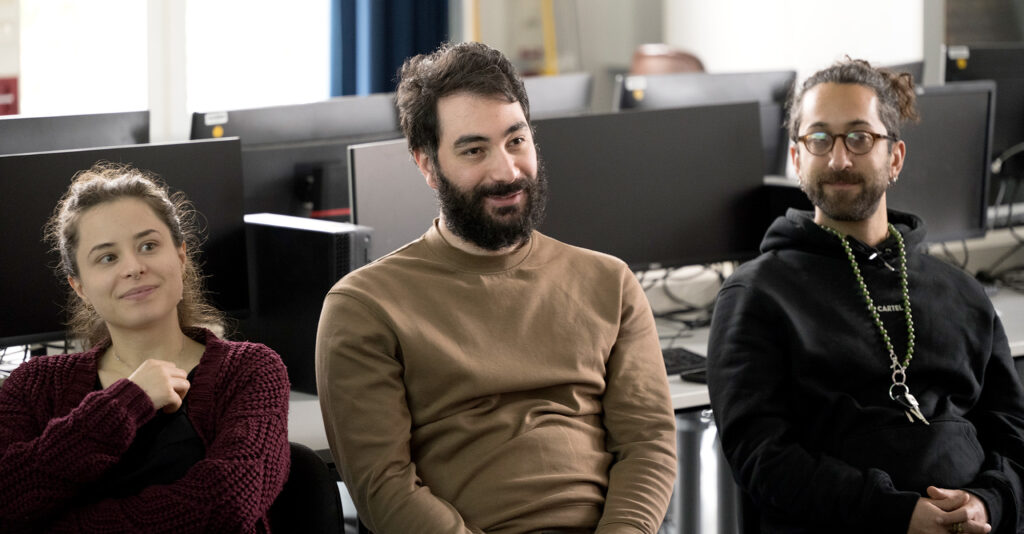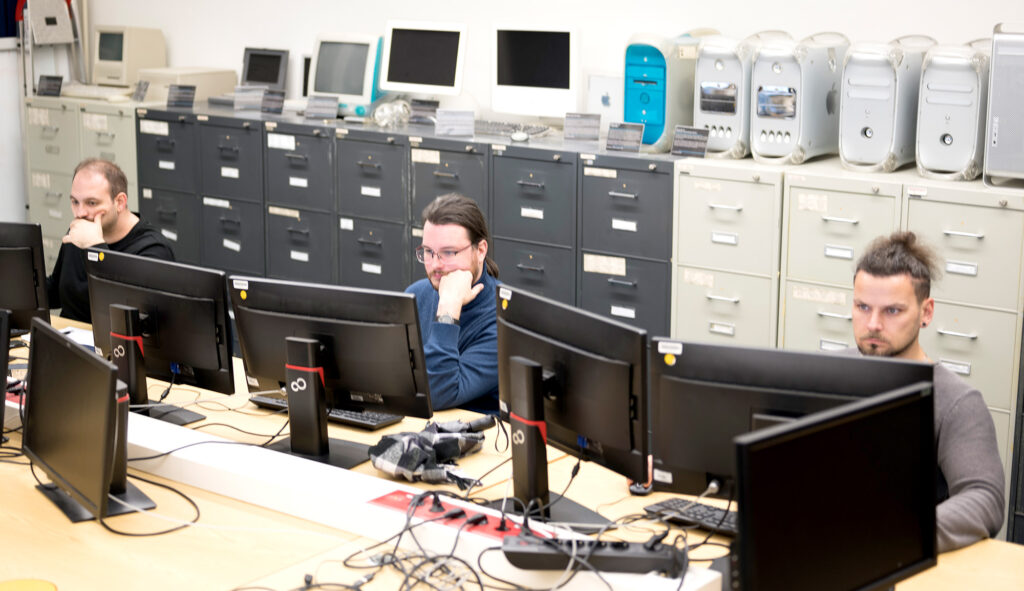Bericht: Archaeogaming Hackathon Köln
Vom 6. bis 8. Dezember 2024 fand der erste Archaeogaming-Hackathon des DiKopA-Netzwerks statt. Innerhalb von drei Tagen gelang es neun Studierenden, drei Spiele zu entwickeln. Dabei wurde die Software-Suite RPGMaker MV eingesetzt. Die folgenden Erfahrungsberichte wurden von den Studierenden selbst verfasst und geben einen Einblick in die Ergebnisse des Hackathons, die auf der Unterseite „Hackathons“ eingesehen werden können.
Gruppe 1: Excavation Manager
Civan Erbay, Sophie Török und Emre Resuloğlu

When we decided to sign up for the Hackathon, the idea of combining our passion for both archaeology and video gaming was one of the decicive factors. The process of gamification was the most interesting one. We were confronted with the question whether a game that realistically emulates archaeological field work is entertaining by itself, or if it requires further elements in order to keep the attention of a player.
In most video games related to archaeology, there is a most common cliché-type factor, where the player finds some artifact which is basically lying around and can be simply picked up. Sometimes, artifacts are hidden behind puzzles, some of which are part of some ancient machinery. Upon picking up artifacts, entire buildings tend to start falling apart, as part of some ancient process, installed to „protect“ the artifact. Even the theme that artifacts or archeological sites are “cursed” in some way is widely spread in video games.
This way of dealing with artifacts has a interesting shift of attention, as it puts the importance on a sole artifact, whereas „real“ archaeologists would be more interested in the archeological site in its entirety. An archaeologist would usually look at the complete site to gain information on the way a society lived, the technologies they applied (e.g. for building) and what cultural characteristics (used in the sense of an archaeological culture) they bear in order to make cross-references to other societies and gain scientific insight on the past, rather than picking up a “magical” or “cursed” treasure and then making a run for it.
What does this reveal about the way archaeology is seen or set forth in a narrational perspective in video games? We think it perpetuates the belief that in order for archaeology to be interesting or fun, it needs to have to do with metaphysical entities or magical mysteries to be uncovered. Why else would there be a necessity to have these things that do not represent reality?
In the end, there are many individuals working in scientific fields within archaeology – enjoying their work without the necessity to invoke associations to mysteries or magic. Must we induce from this that archaeologists are never having fun at their work or must we induce that archaeology can be fun without mysteries and magic?
In our attempt, we assumed the latter and tried to represent archaeological fieldwork and “gamificate” it. While many elements that were intended to be used could not yet be implemented due to time constraints (photo boards, taking pictures, a budget system, picking a team of archaeologists with specific skills and backgrounds influencing game decisions, a more ellaborate choice of tools, leveling- and experience-system…) the ones we were able to implement work quite well.
With the time we had, we especially focused on dialogues teaching the players about archaeological fieldwork and the importance of the decision making processes. Since non-archaeologists wouldn’t be able to know these processes, there are many advisors providing additional information if required. We also managed to implement an amusing minigame on feature excavation, and included some funny dialogues and amusing „negative consequences“ when wrong choices are made – after all, the purpose of our game is to be both educational and entertaining! This shows that archaeology games can be realistic, informative and exciting, all at the same time.
Gruppe 2: DigUp!
Lana Allen, Paraskevi Gavra und Maria Sotomayor Chicote

DigUp! was not created in just three days. Our group started the Hackathon with clear ideas of how the final product should look. While one of us wanted to depict the daily life of an archaeologist emphasizing the challenges that an archaeologist must face every day, the other two components of the group wanted to focus more on the material culture by centering the game on coins, and the other depict the role of a digital archaeologist.
Before the Hackathon these ideas were discussed and developed in a game design document, so that once the weekend started, we knew what to work on. Our final idea was to create a video game where the daily life of an archaeologist is depicted, from an excavation to a post-processing area and a digital lab. At the same time, we wanted to make it in a way so that an experienced archaeologist could have fun while playing and a person with no idea could convey knowledge throughout the game. Knowledge which would be tested at the end of the game with a final quiz.
Although it is true that we would have liked to present more than one artefact in the game and not only one coin, and work more on the characters designs, during the final presentation we were happy to show a game which included all the main points we wanted to cover.
The hackathon weekend was for sure tiring but extremely rewarding. After its completion we all enthusiastically agree on the positive outcome of this experience. None of us was an experienced game developer so at some points it was tricky to structure our work properly, but we managed to succeed and have our basic game ready by the end of the Hackathon.
What we basically did was to divide our work among the three days respectively to the amount of work needed to be done. More specifically, on Friday we built the main design of the game, meaning the different sectors/rooms. On Saturday, which was a full day, we mostly did the scenario, any necessary coding or functions and complete the skeleton of the game. And lastly, on Sunday we added or corrected any necessary detail so that we could present a finished 1st-level product.
As an experience, it was definitely demanding but the amount of knowledge, experience and also fun we had was the perfect reward. When the Hackathon started, no one in our group had any experience with RPGMaker. But by the end we had completed a full game, from the opening screen to the closing credits. Including a fully fleshed out game design document, from which DigUp! was planned.
We learned how to create events, minigames, add music, and even include our own character designs. It was amazing to watch our group go from three beginners to RPG Maker pros by the end of the weekend
Gruppe 3: Echos der Vergangenheit
Maikel Kata, Thomas Miksch, Frank Rink

Thomas Miksch, Universität Wien: „Davon hätte ich gerne ein Spiel“ – diesen Gedanken hatte ich während meines Archäologiestudiums in Wien sehr oft. Das Programm RPG Maker MV war mir daher bereits bekannt und ich hatte schon vor dem Hackathon einige kleinere Experimente gebastelt. Dementsprechend war ich für die technischen Dinge zuständig. Ich habe mir daher zum Ziel gesetzt, die Grenzen meiner RPG Maker-Kenntnisse bis an die Grenzen und darüber hinaus auszuloten und dabei so sauber und modular wie möglich zu arbeiten. Durch viele Stunden Tutorials und den Input unserer Tutoren ist mir das auch größtenteils gelungen und ich habe sogar neue Dinge wie das Importieren von Maps gelernt. Aufgrund der knappen Zeit von drei Tagen musste ich aber trotzdem in einigen Fällen provisorische Lösungen implementieren. Mir wurde schnell klar, wie wichtig Zeitmanagement und das Setzen eines realisierbaren Scopes sind. Abschließend möchte ich noch erwähnen, dass mir der Hackathon einen Startpunkt auf meiner Reise als Game Designer gegeben hat: Neben einem tollen ersten Projekt für mein Portfolio konnte ich auch interessante Literaturempfehlungen und neue Kontakte mit nach Wien nehmen.
Frank Rink, Universität Trier: Das klingt interessant, dachte ich mir, als ich die E-Mail für den Hackathon in Köln las. Da ich in meiner Freizeit gerne Spiele mit historischem Hintergrund spiele und mich die Darstellung dieser und der historischen Realität in solchen Spielen sehr interessiert, fiel es mir leicht, mich für den Hackathon in Köln anzumelden. Die Herausforderung, innerhalb von 2 Tagen eine Alpha-Version zu erstellen, war dank unserer Planungen und Vorgespräche sowie der Teamarbeit gut zu bewältigen. Erstens war es für mich eine tolle Erfahrung zu sehen, wie Programmierung und Design funktionieren und ich nehme viel für meinen weiteren Weg mit. Als Zweites, Geschichte und Archäologie durch die immer wichtiger werdende Digitalisierung zu erleben, war für mich ebenfalls wertvoll, vor allem weil die Digitalisierung neue Möglichkeiten der Darstellung und der Forschung selbst bieten kann und viele verschiedene Perspektiven bietet. Nicht zuletzt waren der soziale Austausch, die neuen Bekanntschaften und auch die Ergebnisse der anderen Teilnehmenden sehr inspirierend, wie viele Facetten und Gesichter Geschichte/Archäologie und ihre Darstellung in der Moderne hat und wie unterschiedlich diese interpretiert und gezeigt werden können. Für mich war der Hackathon ein voller Erfolg, was meine persönliche Bereicherung an Wissen, digitalen Kompetenzen und Sozialisierung betrifft.
Maikel Kata, Ruhr-Universität Bochum: Innovative Ideen: Die Teilnehmer zeigten eine beeindruckende Vielfalt an kreativen Ideen zur Umsetzung ihrer Projekte. Viele Projekte entstanden durch das Zusammenspiel verschiedener Disziplinen und Fähigkeiten. Die technischen Voraussetzungen waren anfangs nicht optimal, aber die Mentoren setzten sich sofort zusammen, um das Problem zu lösen. Der enge Zeitrahmen führte bei vielen Teams zu Stress.
Der Hackathon kann eine hervorragende Möglichkeit sein, neue Kenntnisse und Fähigkeiten zu erwerben, insbesondere im Bereich der digitalen Archäologie. Die Veranstaltung hat interessante Ideen und deren Umsetzung hervorgebracht. Die Präsentation der Projekte der einzelnen Gruppen am Ende der Veranstaltung hat allen viel Spaß gemacht.
Das Wochenende war lang, aber nicht lang genug für den Umfang der verschiedenen Aufgaben, die so ein Hackathon mit sich bringt 😉 Ein etwas längerer Zeitraum für die Umsetzung der Projekte könnte die Qualität der Ergebnisse noch weiter verbessern. Die Mentoren waren sehr engagiert und hilfsbereit, nochmals vielen Dank an die Organisation.

